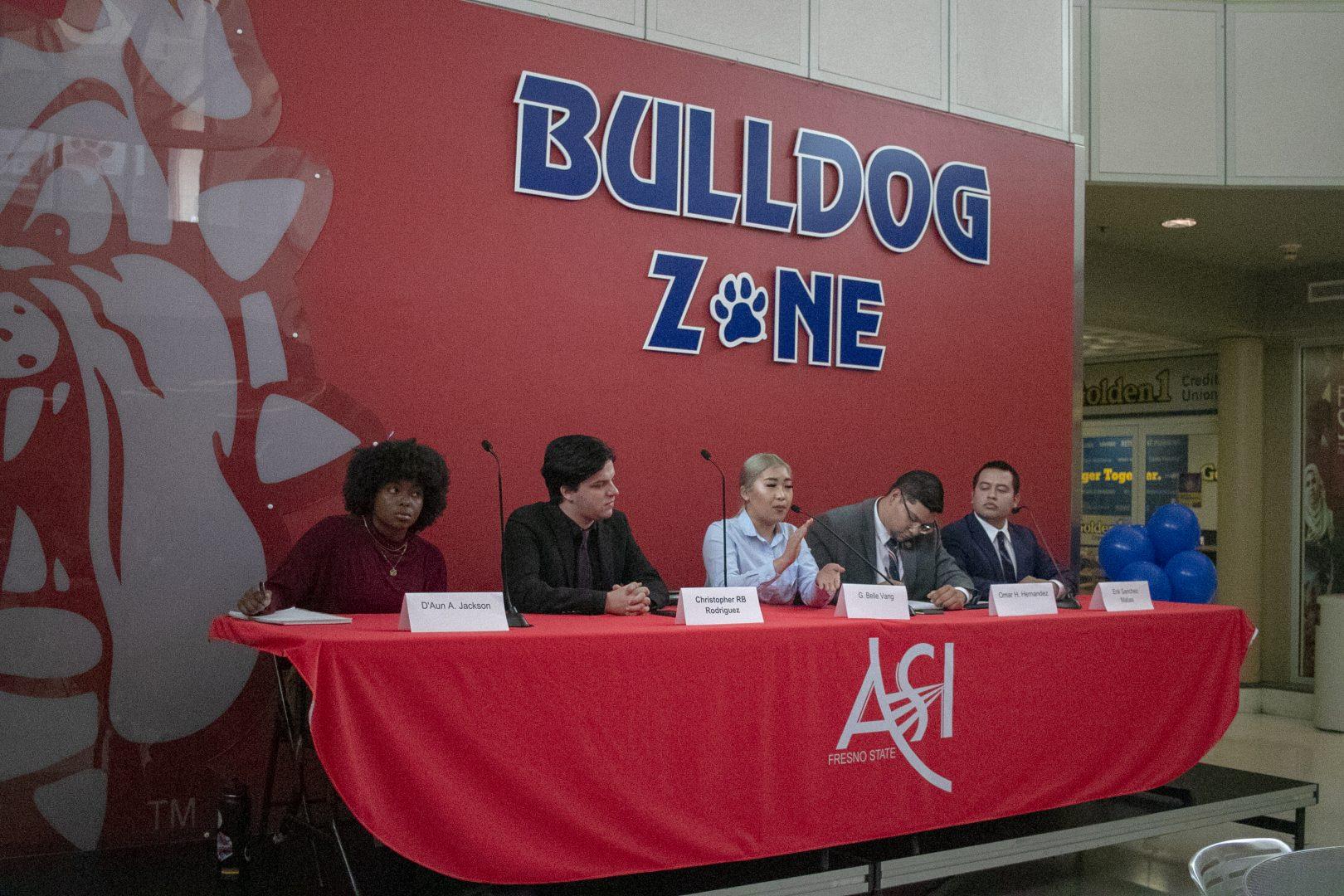The candidates for the Associated Students, Inc. (ASI) presidency offered their thoughts on how they would represent the students of Fresno State as leader of the student government during the ASI Presidential Debate in the Bulldog Zone in the University Student Union on April 5.
Topics discussed ranged from free speech, campus diversity, sustainability and the future of ASI.
The presidential candidates on the panel were D’Aun Jackson, Christopher Rodriguez, G. Belle Vang, Omar Hernandez and Erik Sanchez Matias.
Each candidate was given two minutes to answer questions from the moderators of the debate — Collegian reporters Paige Gibbs and Jacob Mulick.
After brief introductions from the candidates, the first question they were asked pertained to protecting free speech on campus while still protecting the students.
While each candidate acknowledged that there have been speakers and groups on campus that some have found to be offensive or controversial, they agreed that the protection of free speech was a necessary part of the university.
Jackson answered first, stating that when various groups are on campus, she tries to have conversations with them to not only understand their perspective, but to communicate with them that what they say can be intimidating to students and make them feel uncomfortable.
“Students should feel comfortable, no matter where they go,” Jackson said.
“I think that what we need to do is we need to say, ‘Yes, you are allowed to have your opinions, whether or not we agree with them’,” Rodriguez said. “My biggest stance is just to ignore it, and it will go away, because they will not have that power over you.”
Vang disagreed with Rodriguez’s tactic of ignoring the speakers. She said that when she was a freshman, she too thought if the speakers were not given attention they would go away.
“I’ve been here for all four years, and I’ve realized that if you just ignore it, they’re still going to come,” Vang said. “So I think it’s important for us to advocate in a positive aspect and not react to the negative reinforcement they try to put upon us.”
Hernandez echoed Vang’s message of countering hate speech with positivity.
Sanchez Matias stated that the opportunity to speak freely was one of the rights that was so important in America and one of the reasons his parents immigrated to the country.
When the topic turned to diversity, each candidate offered insight into their own background, and how they felt that their experience would help them represent Fresno State’s diverse student population.
Sanchez Matias noted that although he is hispanic, his representation of the student body was not limited to any single ethnicity.
“I’m not just here for the hispanic group here at Fresno State. I’m here to stand up for all races, all genders, no matter your sexuality, what group you come from or your political views,” Sanchez Matias said.
The other candidates agreed that the ASI president should not simply try to represent the various groups of students on campus, but should actively seek out ways to better represent them.
In discussing how they would improve on ASI, the candidates suggested furthering the outreach of the student government.
Vang said that when she asked classmates if they were aware of what ASI does and what it had to offer, she was surprised to learn that many were not familiar with the opportunities the student government provides.
The other candidates echoed Vang’s statement that the awareness of available programs was not sufficient, and that one of the most impactful things that they could do as ASI president is to increase the visibility of the student government.
Rodriguez emphasized the necessity of transparency of the student government, while Hernandez advocated for more accountability from ASI.
Jackson said that one of the best ways to improve outreach was through technology, noting that ASI is currently working on an app that she believed could better serve students by providing a central hub for accessing information about the university.
Questions submitted from the audience asked the candidates about their views on sustainability, as well as representing undocumented students.
Each candidate advocated for more resource-conscious programs, such as more recycling containers and eliminating single-use plastic straws.
On the subject of undocumented students, Sanchez Matias noted his own status as a Deferred Action for Childhood Arrivals (DACA) recipient, and how that gave him a unique insight on the issues faced by those students.
The other candidates agreed that undocumented students should be advocated for and deserved as much representation from ASI as the rest of the student body.
When the candidates offered their closing statements, they each made it a point to emphasize the importance of exercising the right to vote — even if it wasn’t for them.




